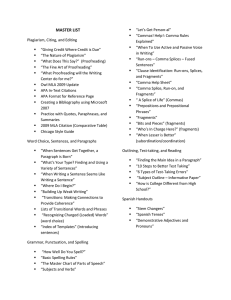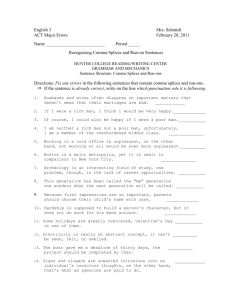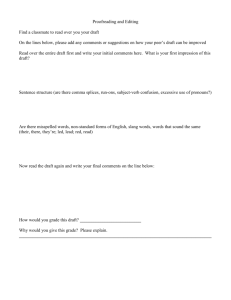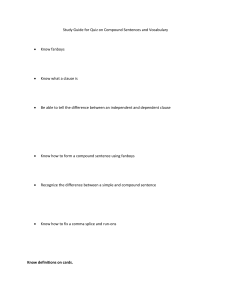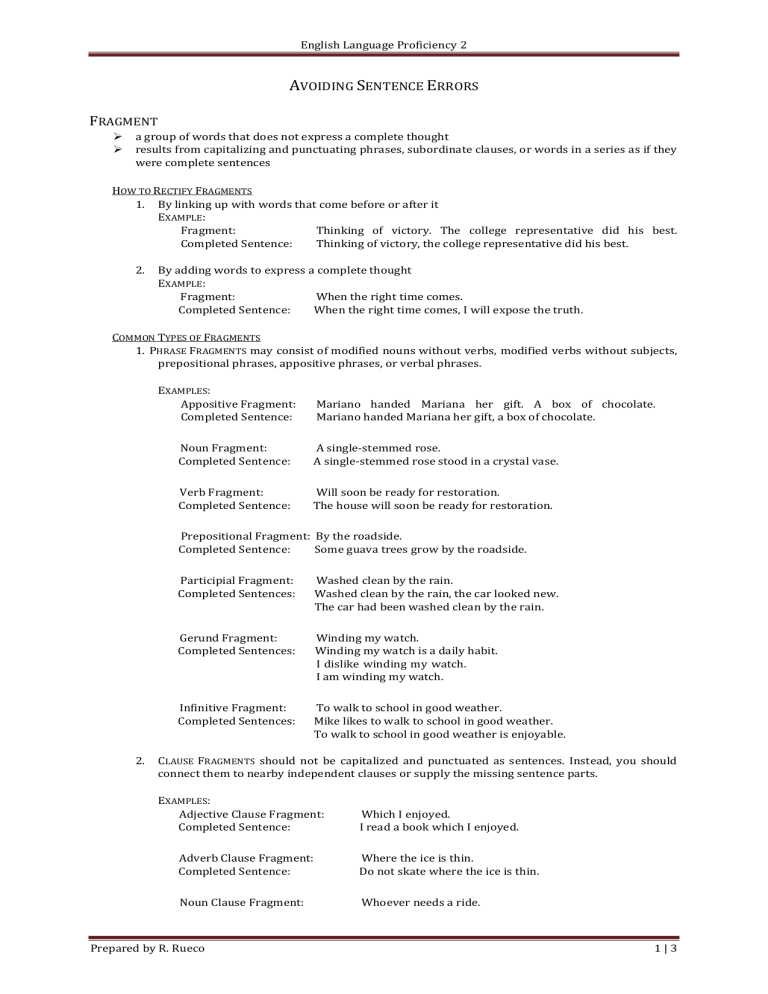
English Language Proficiency 2 AVOIDING SENTENCE ERRORS FRAGMENT a group of words that does not express a complete thought results from capitalizing and punctuating phrases, subordinate clauses, or words in a series as if they were complete sentences HOW TO RECTIFY FRAGMENTS 1. By linking up with words that come before or after it EXAMPLE: Fragment: Thinking of victory. The college representative did his best. Completed Sentence: Thinking of victory, the college representative did his best. 2. By adding words to express a complete thought EXAMPLE: Fragment: When the right time comes. Completed Sentence: When the right time comes, I will expose the truth. COMMON TYPES OF FRAGMENTS 1. PHRASE FRAGMENTS may consist of modified nouns without verbs, modified verbs without subjects, prepositional phrases, appositive phrases, or verbal phrases. EXAMPLES: Appositive Fragment: Completed Sentence: Mariano handed Mariana her gift. A box of chocolate. Mariano handed Mariana her gift, a box of chocolate. Noun Fragment: Completed Sentence: A single-stemmed rose. A single-stemmed rose stood in a crystal vase. Verb Fragment: Completed Sentence: Will soon be ready for restoration. The house will soon be ready for restoration. Prepositional Fragment: By the roadside. Completed Sentence: Some guava trees grow by the roadside. 2. Participial Fragment: Completed Sentences: Washed clean by the rain. Washed clean by the rain, the car looked new. The car had been washed clean by the rain. Gerund Fragment: Completed Sentences: Winding my watch. Winding my watch is a daily habit. I dislike winding my watch. I am winding my watch. Infinitive Fragment: Completed Sentences: To walk to school in good weather. Mike likes to walk to school in good weather. To walk to school in good weather is enjoyable. CLAUSE FRAGMENTS should not be capitalized and punctuated as sentences. Instead, you should connect them to nearby independent clauses or supply the missing sentence parts. EXAMPLES: Adjective Clause Fragment: Completed Sentence: Which I enjoyed. I read a book which I enjoyed. Adverb Clause Fragment: Completed Sentence: Where the ice is thin. Do not skate where the ice is thin. Noun Clause Fragment: Whoever needs a ride. Prepared by R. Rueco 1|3 English Language Proficiency 2 Completed Sentence: 3. Whoever needs a ride may come with us. SERIES FRAGMENTS, series of words or phrases, may be so long that it fools you into thinking it is a sentence. To avoid series fragments, be sure that each of your sentences has a subject and a verb. EXAMPLE: Series Fragment: A flowering pink bougainvillea near the fence, yellow gumamela along the border, and neat beds of red roses. Completed Sentence: A flowering pink bougainvillea blooms near the fence, yellow gumamela dot the border, and neat beds blaze with red roses. LET’S DO IT! Use each fragment in a sentence. Example: A terrible case of pneumonia. My cousin was diagnosed with a terrible case of pneumonia. 1. Whomever he invites. 2. Petrified human bones. 3. Frequent loud interruptions. 4. Laughed, shouted, and romped. 5. Watching, stalking, and pouncing. 6. Where grass and reeds grew high. 7. While she was shouting after the bus. 8. Which recalled a time of carefree days. 9. Must have been abandoned by someone. 10. Sometimes downcast, depressed, or just unhappy. RUN-ONS Two or more sentences that are capitalized and punctuated as if they were one Can be corrected by using punctuation, conjunctions, or other means to join or separate the parts EXAMPLE: With No Punctuation: He rushed down the subway steps an angry woman followed close behind. COMMA SPLICE Two or more independent clauses connected with only a comma EXAMPLE: With Only a Comma: This is a very belated birthday card, my birthday was three months ago. REMEMBER: Like fragments, run-ons are usually the result of carelessness and haste. Avoid them by rereading your work, aloud if necessary. Listen for the natural stops that indicate where your sentences end. CORRECTING RUN-ONS AND COMMA SPLICE WITH PUNCTUATION AND CONJUNCTIONS RUN-ONS AND COMMA SPLICE SENTENCES WITH END MARKS Edith slumped into a chair, the worst had happened. Will summer ever come? We doubt it very much. Edith slumped into a chair. The worst had happened. RUN-ONS AND COMMA SPLICE SENTENCES WITH COMMAS AND CONJUNCTIONS Storm clouds gathered lightning lit up the sky. They may have stopped to eat, they may be lost. Storm clouds gathered, and lightning lit up the sky. They may have stopped to eat, or they may be lost. Will summer ever come we doubt it very much. Prepared by R. Rueco 2|3 English Language Proficiency 2 RUN-ONS AND COMMA SPLICE SENTENCES WITH SEMICOLONS He doesn’t merely like fishing he adores it. He doesn’t merely like fishing; he adores it. Charlene hates cooking, therefore, she never Charlene hates cooking; therefore, she never invites invites anyone for dinner. anyone for dinner. CORRECTING RUN-ONS AND COMMA SPLICE BY REWRITING 1. Run-ons and comma splice can be rewritten to form simple sentences. EXAMPLES: Comma Splice: Julie sometimes comes over to visit us, her little brother comes too. Compound Subjects: Julie and her little brother sometimes come over to visit us. Run-ons: Leaping from behind the chair, the kitten batted the yarn, then she dashed across the rug. Compound Verbs: Leaping from behind the chair, the kitten batted the yarn and then dashed across the rug. 2. One of the independent clauses in run-ons and comma splice can be used as an appositive. EXAMPLE: Comma Splice: The restaurant was well-known for its pastry and sauces, it was a small French café. Appositive Phrase: The restaurant, a small French café, was well-known for its pastry and sauces. 3. Run-ons and comma splice can be rewritten to form complex sentences. EXAMPLE: Run-ons: The picnic may be canceled it may rain all afternoon. Subordinate Clause: The picnic may be canceled if it rains all afternoon. Because it may rain all afternoon, the picnic may be canceled. LET’S DO IT! Use an end mark, a comma and a coordinating conjunction, or a semicolon to correct each of the first five run-ons and comma splice. Form a simple or complex sentence to correct each of the last five run-ons and comma splice. Example: I didn’t like the movie, it was way too long. I didn’t like the movie. It was way too long. I didn’t like the movie because it was way too long. 1. 2. 3. 4. 5. 6. 7. 8. 9. 10. Every year at this time the snow melts and the stream flows, in six months, however, it will be dry. They bought an old mill, eventually they were able to make it into a unique and beautiful home. Jude dropped out of school in her junior year, she received a diploma years later. Days turned into years, the years seemed endless. Will he leave his job and its security to try his luck at farming it seems unlikely. Sir Winston Churchill was a brilliant man he was the English Prime Minister during World War II. Catherine II was a Russian Empress, she was called Catherine the Great. Mat was afraid of bees, he had a severe allergic reaction to their stings. In the spring sparrows come to our bird feeder, an occasional dove also makes an appearance. Rapunzel let her long hair fall to the ground, her name means “lettuce.” REFERENCES: Brookes, E. D., et. al. (2012). Voyages in English: Writing and Grammar. Chicago: Loyola Press. Forlini, G., et. al. (2010). Prentice Hall Grammar and Composition. Singapore: Pearson Education South Asia Pte Ltd. Glencoe/McGraw Hill. (2000). Grammar and Composition Handbook. Columbus: Glencoe/McGraw Hill. Ramos, C.M., & Sanchez, A.C. (2010). Developing Skills in Grammar and Composition 1. Mandaluyong City: National Book Store. Prepared by R. Rueco 3|3

